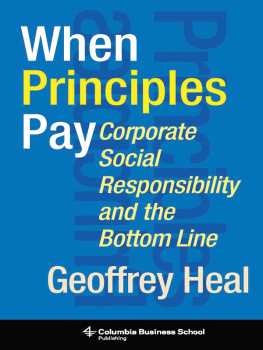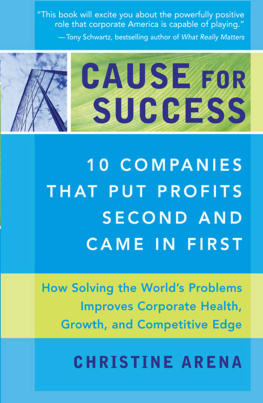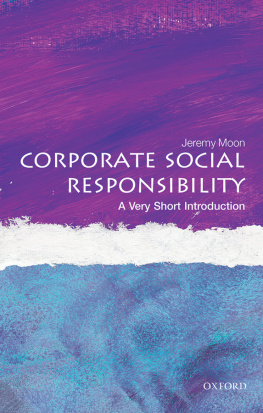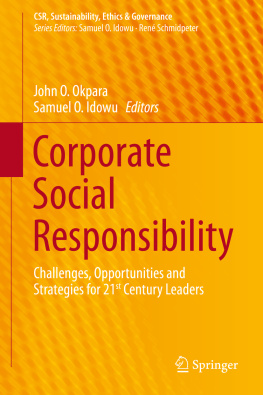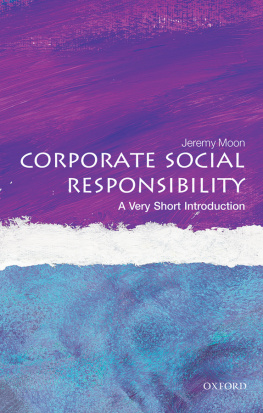WHEN PRINCIPLES PAY
WHEN PRINCIPLES PAY
Corporate Social Responsibility and the Bottom Line
Geoffrey Heal
| Columbia Business School |
| Publishing |
Columbia University Press
Publishers Since 1893
cup.columbia.edu
New York Chichester, West Sussex
Copyright 2008 Columbia University Press
All rights reserved
E-ISBN 978-0-231-51293-0
Library of Congress Cataloging-in-Publication Data
Heal, G. M.
When principles pay : corporate social responsibility and the bottom line / Geoffrey Heal.
p. cm.
Includes bibliographical references and index.
ISBN 978-0-231-14400-1 (cloth : alk. paper)ISBN 978-0-231-51293-0 (e-book)
1. Social responsibility of businessEconomic aspects. 2. ProfitMoral and ethical aspects. 3. Industrial managementSocial aspects. 4. Social justice. 5. Business ethicsCase studies. I. Title. II. Title: Corporate social responsibility and the bottom line.
HD60.H398 2008
658.4908dc22 2008002767
A Columbia University Press E-book.
CUP would be pleased to hear about your reading experience with this e-book at .
To my wife and daughters
CONTENTS
We have always known that heedless self-interest was bad morals; we know now that it is bad economics.
Franklin Delano Roosevelt, January 20, 1937
Are principled behavior and profitable behavior intrinsically in conflict, or can corporations do well and also do good? Newspaper headlines suggest a conflictwe see stories of mortgage companies enriching themselves by predatory lending to poor families, defense contractors entering into improper relationships with defense department officials, coal companies and automobile companies lobbying aggressively to allow continued emissions of greenhouse gases, and investment banks and rating agencies packaging junk bonds as high-quality debt. These examples all suggest that businesses have found it necessary to behave in an unprincipled fashion to make money. The headlines, however, give only part of the story: what you can easily miss is that some of the worst predatory lenders are now bankrupt, the defense contractor executives responsible for improper relationships with the defense department have been fired and the company fined, and many of the investment bankers responsible for the excesses of the structured finance binge of 2006 and 2007 will have lost their jobs by the time this book is in print. True, the auto companies and coal companies are still lobbying aggressivelybut almost as if to spite them the worlds most valuable and profitable car company is Toyota, which has positioned itself as the green car company par excellence. Perhaps the headlines are misleading; perhaps there is a cost to antisocial corporate behavior that is felt on a slightly longer timescale than the apparent gains. And of course headlines are notoriously biasedthey only tell us what is deemed newsworthy, and good behavior is rarely as newsworthy as bad. So we dont see headlines telling us that for the last decade BP has been reducing its greenhouse gas emissions voluntarily, that Starbucks works to reduce the environmental impact of coffee production, or that Nike and other footwear and textile makers are working to monitor and improve labor conditions at their subcontractors. Nor do we see headlines telling us that stock markets penalize companies for poor environmental behavior or that socially responsible investment (SRI) funds shun the sin stocks of companies with poor social or environmental records. Yet all of these things are true.
There is indeed a temptation to cut social and environmental corners in pursuit of short-term profits, but there are widespread and increasingly powerful forces that penalize those who transgress and reward those who do not. This book is about these two sets of forces and the balance between them. In fact, as most of us are only too aware of why it is tempting to cut corners, most of the book is about the countervailing forces, the forces that reward those who behave well and penalize the corner-cutters. These forces are not so obvious, and some will probably surprise you, especially the role of capital markets.
The main point that I want to make is that our market-based economy and its political environment are evolving fast, particularly with respect to the treatment of behavior that is socially or environmentally damaging. What is acceptable behavior is changing; furthermore, penalties are routinely associated with unacceptable behavior, as are rewards with acceptable behavior. These incentives operate outside of the marketplace in the strict and narrow sense and involve interactions between corporations, regulatory bodies, consumers, and civil society in the form of nongovernmental organizations (NGOs) and activist groups. Taken together, these interactions can significantly change the attractions of the alternatives facing a corporation. They can make antisocial behavior much less attractive than it might have been only a decade or so ago. Consumers or regulatory bodies, spurred on in many cases by NGOs or other activist groups acting through the Internet, can react quickly to behavior that they disapprove of, in the process damaging a companys prospects.
The chapters that follow give many examples. Stock markets have come to anticipate some of these consequences and mark down the shares of companies opening themselves up to such damages. In part, this is due to the activities of SRI funds, but the effect seems to go beyond anything that can be explained by the scale of these funds. Chapters 2 and 3 explore these issues.
Subsequent chapters study how these issues play out in particular industries and companiesthe financial sector and Citibank, pharmaceuticals and Merck, Wal-Mart, Starbucks, Monsanto, and Interface. We then switch to a global perspective, looking at globalization, child labor, and marketing goods and financial services to the very poor. Then we try to bring all this together from the perspective of corporate executives.
This is an optimistic book. It starts from the premise that capitalismas we knew it from the 1950s to the end of the last centurywas massively successful at generating income and economic growth but often at the expense of the natural environment and sometimes at the expense of the underprivileged. The growing environmental and social costs of economic activity were daunting and seemed to some to call into question the whole enterprise of economic growth. Now things are changing: they have not yet changed enough, but we can see where they are going; we can see the outline of a new system in which we can enjoy the undoubted benefits of a competitive market economy without the social or environmental costs. It is a system in which the forces that I describe in this book have grown stronger and become more clearly articulateda system where consumers and civil society groups, together with activist shareholders and SRI funds, play an increasing role in shaping the incentives faced by the corporate world. It is a system in which principles pay.
Goodness is the only investment that never fails.
Henry David Thoreau
Companies face choices on environmental and social issues. They can worry about pollution or greenhouse gas emissions, or ignore them. Likewise, they can be concerned about employment conditions in third-world subcontractors, or neglect them. This book is about the incentives that they face in making these choices. Are there incentives that lead a corporation to minimize its environmental impact, or to take a stance that is supportive of minorities and of the less privileged members of society? Or are the forces that they face neutral on these issues or even oriented in the opposite directions? These questions matter. Corporations have profound impacts on society in many ways over and above the obvious one of producing goods and services for us. They can generate pollution, drive globalization, employ low-paid labor in poor countries, and contribute to climate change, to name only a few. Their actions in these areas are controversial. So it matters whether they face incentives to direct these impacts in a manner consistent with the social good. I am going to argue that in many cases they do. But an important part of the argument is that this does not happen automatically: it happens as the result of the interaction of a range of nonmarket forces involving the legal system, the regulatory framework, and, increasingly, civil society. The theme of this book is therefore the interactions between corporate behavior and civil and legal society, and how these interactions structure the companys incentives on social and environmental issues.


